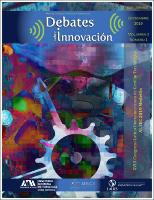| dc.contributor.author | Beltrao, Carolina | |
| dc.contributor.author | Pasa, Carla | |
| dc.date.accessioned | 2021-05-29T00:00:04Z | |
| dc.date.available | 2021-05-29T00:00:04Z | |
| dc.date.issued | 2019 | |
| dc.identifier.uri | https://hdl.handle.net/20.500.13048/1696 | |
| dc.description.abstract | This paper proposes a model for analyzing the elements which influence the trajectory of social innovation (SI) initiatives expansion. Social innovation concept consider those initiatives that have the purpose of generating new social responses, based on activities developed by a collective of actors, in a process that may be related to products, services, interventions or knowledge. Methodologically, this research had a qualitative approach, using Adaptive Theory in four steps for elaborating the theoretical model. The first step was from the result of literature; the second and third steps were to discuss the model and its concepts, with academics and researches, both specialists in SI; and the fourth step consisted of two Brazilian SI case studies. As conclusion, the analytical model is presented suggesting to management of existing SI initiatives and to contribute proposing public policies that use social innovation as the main reference. | |
| dc.language.iso | eng | |
| dc.rights | info:eu-repo/semantics/openAccess | |
| dc.rights | Atribución-NoComercial-SinDerivadas 2.5 Perú | |
| dc.rights.uri | http://creativecommons.org/licenses/by-nc-nd/2.5/pe/ | |
| dc.subject | Innovación social | |
| dc.subject | Valor social | |
| dc.subject | Cambios sistémicos | |
| dc.subject | Teoría adaptativa | |
| dc.title | Social Innovation Initiatives Expansion | |
| dc.type | info:eu-repo/semantics/conferenceObject | |
| dc.relation.conferencedate | 30 de octubre-1 de noviembre, 2019 | |
| dc.relation.conferencename | XVIII Congreso Latino-Iberoamericano de Gestión Tecnológica | |
| dc.relation.conferenceplace | Medellín, Colombia | |
| dc.contributor.corporatename | Fundação Joaquim Nabuco | |
| dc.contributor.corporatename | Universidade Federal de Pernambuco | |


